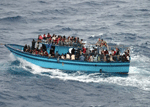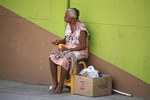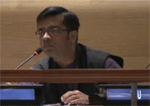Published on Mon, 2013-10-07 23:00
The tragic loss of some 300 refugees off Lampedusa on October 3 gives public focus to the harsh and cruel reality facing thousands fleeing insecurity and oppression in the countries of their birth. A boat which traveled from Libya caught fire in close reach of the Italian coast. There were some 500 Eritreans on board, but only 147 were rescued according to media reports. The large loss of life taking place in sight of the Italian beaches has shocked Italy, Europe and the world. It emphasizes the failure of Europe and Africa to protect the rights of refugees who embark on their perilous voyages believing that they have little choice. According to the UN, 30,100 migrants reached Italy by sea so far this year and some 7,500 Eritreans have been registered amongst them. October 5 is being observed as a day of mourning and Pope Frances has called for ‘a day of tears’. |
Published on Mon, 2013-10-07 23:00
The Italian government has published the names of the occupants of the boat that drowned near Lampedusa on October 3. All those on the list appear to be Eritreans. At the weekend hundreds of bodies were recovered, washed ashore on the Italian island of Lampedusa. The European Union is soul-searching and identifying the problems of its increasingly repressive refugee and asylum policy. A meeting of Ministers of Home Affairs has been called in Luxemburg to consider a package of measures, in a first response to the Lampedusa tragedy. Observers are pointing out that the effect of the European policy to effectively control the ‘safe routes’, forces the most desperate refugees to take ever bigger risks in their attempt to reach safety. |
Published on Sun, 2013-10-06 23:00
With no haste, but without pause, the participation of women in the labour market has seen accelerated growth since the 1970s, according to the Panorama Laboral 2012 of the International Labour Organization (ILO). There is a gradual closing of the differences in participation between men and women in the labour force. The participation rate of women in Latin America in 2012 was 49.8%, the employment rate was 40.2% and the unemployment rate 7.7%, while for men the participation rate was 71.4%, employment 59.8% and unemployment 5.6% |
Published on Thu, 2013-10-03 18:55
The event "From aspiration to action: A Human Rights Framework for the post-2015 Agenda" took place on September 25, 2013 at the United Nations in New York, with participation from the Tunisian Minister for Social Development, Mr Khalil Zaouia; Ms. Patrizianna Sparacino, French Ambassador for Human Rights; Mr. Ivan Šimonović, Assistant Secretary-General for Human Rights, OHCHR; Ms. Saraswathi Menon, Director of Policy Division, UN Women and Roberto Bissio, from Social Watch. Social Watch coordinator, Roberto Bissio, "Humans have rights and they are inalienable, corporations have privileges and those are revocable." To see his participation on the debate click here. |
Published on Thu, 2013-10-03 14:55
Speaking at the UN General Assembly articulating the Indian civil society aspirations on actions to make the new development agenda work in developing nations that are home to 85 percent of the world's poor, Amitabh Behar representing National Social Watch (India) and Wada Na Todo Abhiyan emphasized that, “for the new development agenda to succeed, we need to move away from a poverty lens to a more holistic justice frame.” The new development frame will succeed the current Millennium Development Goals (MDGs) that expire in 2015. Mr. Amitabh Behar, a representative of a coalition of 4,000 Indian civil society organisations under the umbrella National Social Watch and Wada Na Todo Abhiyan, voiced the civil society concerns related to the new development agenda at the UN Special Event on MDGs at the 68th General Assembly in New York on September 25. |








